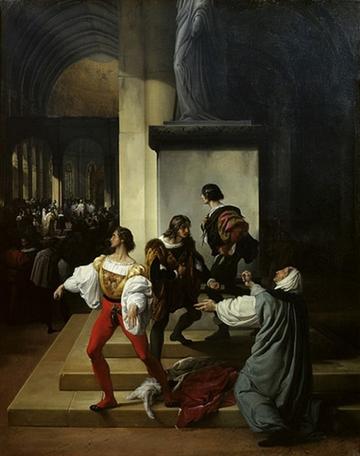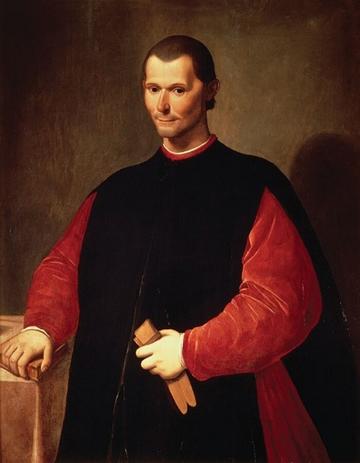The Renaissance 'Age of Conspiracies' Revisited: Intellectualising a Sixteenth-Century Coup D'état
It has been difficult for historians of Renaissance conspiracies to move beyond the assessment put forth in Machiavelli’s Discorsi: namely that ‘all conspiracies are made by great men’. From the Pazzi and Lampugnani conspiracies of the late-fifteenth century, to the schemes to murder Pope Paul III’s son, the history of Renaissance conspiracies has often been viewed as one of Francesco Hayez’s romantic paintings: an aristocratic fight against tyranny. Unsurprisingly then, the study of conspiracies as distinct historical events has traditionally centred around the world of high politics. The intellectual dimension of a conspiracy has instead tended to focus on abstract treatises on regime change or tyrannicide. Almost no historians have analysed the intellectual defence or condemnation of specific conspiracies which actually occurred. This is startling given the historic attention paid to cultural and intellectual history by Renaissance specialists – one only needs to think to Burckhardt’s Kulturgeschichte or Croce’s history of Baroque culture. Conspiratorial political action has thus remained in the purview of high political, and often local historians. However, developments in the sphere of early modern political communication and unrest – from Natalie Zemon Davies to the likes of Filippo de Vivo, Helmer Helmers, Jeffrey Sawyer, or Massimo Rospocher – must lead us to reassess this phenomenon. What Riccardo Fubini had called an ‘Age of Conspiracies’, can and should be treated as more than a sequence of aristocratic squabbles.
As the Italian Wars saw Italy trapped in a struggle between France and the Habsburgs, regime change became an important tool for achieving foreign policy objectives. The language deployed in these attempted coup d’états uncovers shared and contested notions of government, representation, and presents how Italian polities conceived themselves in relation to France, Charles V’s Empire, or the Papacy. Conspiratorial action was thus justified, defended, or condemned coherently and vehemently by the leading minds of the day. Historians must shift their attention to this intellectual conspiratorial dimension. Marta Celati’s monograph, Conspiracy literature in Early Renaissance Italy: historiography and princely ideology (2014) addressed the role of literature in fifteenth-century conspiracies. Celati’s literary analysis offers a route which may help sixteenth-century historians in seeking to intellectualise conspiracies. There is a second direction. These plots offer a lens into how ideas were spread and manipulated across society. The field of “popular politics” can help to place the role of ideas at the forefront of the study of these conspiracies. Considerations relative to “popular opinions” were omnipresent in the correspondence of leading political figures, from Paul III’s cardinal-nephews to Charles V’s ministers Granvelle and the Duke of Alba. Contemporaries saw conspiratorial language, and its influence across society, as central to a conspiracy’s success.
Why has the intellectual battle over a conspiracy been largely ignored? The answer lies in an understanding of Renaissance plots as single-day events. By focusing on conspiracies and coups and isolated incidents, we fail to pay adequate attention to the ideological and linguistic connections between them, as well as the way in which they were discursively justified and legitimated before and after the event, thus neglecting their broader cultural salience. The very importance of ideas in relation to conspiratorial action was evident to contemporary thinkers. One commentator, discussing plots in mid sixteenth-century northern Italy, believed the ‘series of conspiracies of our age’ were caused by the reading ‘of the life of Nero, the Bellum Catilinae, and the book by Niccolo Machiavelli nicknamed the Prince’. For this thinker, it was through reading about the ideas in these works that conspirators ‘may learn to become cruel’.

Francesco Hayez’s Lampugnani’s Conspiracy (1826), Pinacoteca di Brera (Milan)
Analysing conspiratorial language suggests the existence of a shared language of regime change. Plots were framed as an aristocratic republican defence of the common good, harking back to the Roman optimates. Such a language was used for differing reasons and with varied effects. For instance, in the Republic of Genoa during an attempted coup in the late 1540s, the leading conspirator Count Fieschi condemned the ‘close and absolute tyranny’ of the regime headed by Prince Andrea Doria. In another speech, Fieschi reportedly called for regime change for the ‘defence of your families […], of our fatherland’s liberties’. However, Doria himself equated Fieschi’s plot as an attack on ‘our liberties’ and claimed that his role as Pater Patriae had consolidated republican stability. In doing so, Doria had also fused Machiavelli’s two definitions of conspiracy – as either against a prince or the state – into a single formula which did not allow any space for justifying regime change. In a 1547 plot to murder Pierluigi Farnese, Duke of Parma and Pope Paul III’s illegitimate son, the aristocratic conspirators styled themselves as ‘liberators of the land’ against the ‘slavery’ and ‘domestic crimes’ perpetrated by him. Interestingly, the conspiratorial manifesto requested respect for their territory’s ‘ancient constitutions’, which included a return to a restricted oligarchical republic. The conspirators wrote to the Imperial governor of Milan, stating that it was ‘well known to all […], that killing a tyrant was legal’, and justified in order to avoid the further ‘impoverishment of the people’.
Conspiratorial language is highly revealing of how Italian polities perceived themselves in relation to foreign powers. These foreign associations could make or break a conspiratorial movement. Fieschi, for instance, keenly paraded the 1227 grants made by Frederick II to his family for political legitimation, while Doria used his alliance with Charles V to present himself as the real imperial agent in Genoa. Charles V’s adoption of universalistic notions of monarchy was extremely useful for conspiratorial legitimation. The feudal links held by leading nobles with the Empire could be used as a vehicle to dispute and undermine the authority of a local sovereign prince. This imperial vassalage importantly allowed pro-imperial forces to govern with a certain degree of autonomy. The French could not count on this feudal flexibility, as their claims to power in Italy were wholly dynastic. While pro-imperial regime change conserved partial local autonomy for the polity in question, French backed regime change often culminated in direct occupation. The situation in the 1540s-1550s, a period of Franco-Papal alignment, demonstrates this problem. Conspirators broadly within a pro-French umbrella would often appeal to universalistic notions of papal government, entirely avoiding any mention of the Valois monarchy. Instead, Imperial political actors would brand anti-Habsburg conspiracies as wholly French rather than Papal. This is brilliantly illustrated in a draft report by Ferrante Gonzaga, Charles V’s Governor of Milan, where he expressed concern for the operation of the papal ‘Guelf faction’. Crucially, however, Gonzaga crossed ‘Guelf’ out, and replaced it with the word ‘French’, revealing an acute awareness of the power of language in conspiratorial politics.

Santi di Tito’s Portrait of Niccolò Machiavelli, Vecchia Cancelleria (Florence)
The process of intellectualising Renaissance conspiracies entails placing greater emphasis on the broader transnational and cultural significance of plots, instead of them being consigned to the lofty and isolated realm of high politics. Focusing on these linguistic and intellectual connections sheds light on popular political considerations. Indeed, leading contemporaries believed that regime change required sustained widespread support after the plot. There was thus a concerted attempt to manipulate information to secure support and spread ideas in a format that could be digested by the populace across different societal sectors. The correspondence of two of Charles V’s ministers, Gonzaga and Granvelle, reveals their obsession with finding out whether the populace ‘was partisan for France’. One solution was to hire preachers ‘to whisper’ across northern Italy. Imperial agents were tasked with penning several satirical tracts defending the murder of the Pope’s son, whilst the Pope’s family commissioned their own works to condemn the murder. An interesting vehicle for the spread of ideas across society were the pasquinades, the infamous rhymes pinned under several statues in Rome which were often read out loud. Some of these employed ideas from Dante and Marsilius of Padua’s pro-imperial writings to rally support for regime change. The homosexual Pierluigi Farnese was ridiculed in these rhymes for his intention ‘to impale the arse of Saint Peter’ and was presented in the company of several of the devils present in Dante’s Inferno. Another called for the population to rebel and ‘shit on him [Pierluigi Farnese]’. The format of these rhymes, often following prayers or invocations, also suggests that there may have been an attempt to further spread these ideas through oral cultures, leaving glimpses of opinions of those who left no written records themselves.
Intellectualising the ‘Age of Conspiracies’ – and locating them within their discursive contexts of justification and legitimation – thus enables us to overturn a narrow, high-political paradigm. Not only are we able to uncover broader transnational and cultural entanglements, but also to recognise, as did contemporaries, the involvement of large sections of society. Although conspiracies had political and military objectives, they necessitated continued support and rationalisation, with discursive and intellectual ramifications. Indeed, when the Duke of Florence described how the French ‘were ready to light up these fires all across Italy’, he was not only fearful of the geopolitical repercussions of regime change but was more importantly warning his reader of the societal and intellectual consequences which these conspiracies entailed.
Antonio Pattori is a DPhil candidate in History at University College, Oxford.


